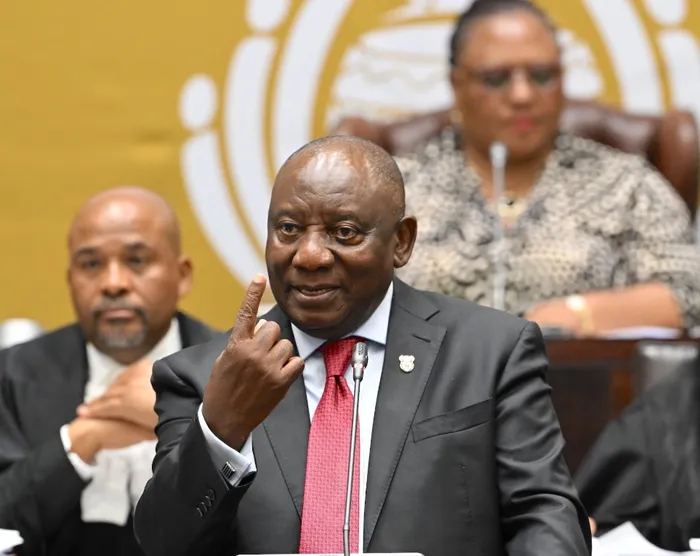Ramaphosa defends deputy ministers, saying they play crucial role in governance

President Cyril Ramaphosa responded to the questions by MPs in Parliament, Cape Town, on Tuesday.
Image: Siyabulela Duda / GCIS
President Cyril Ramaphosa has again come to the defence of deputy ministers, stating that they play a crucial role in assisting ministers in the performance of their functions and responsibilities.
Responding during the oral question session in the National Assembly on Tuesday, Ramaphosa said the deputy ministers play a critical role and that they should be given more responsibilities.
“Those deputy ministers are distinguishing themselves as real contributors to our governance. And what I also really appreciate is the fact that many of our deputy ministers are working so well with their minister colleagues,” he said.
The size of the Cabinet has raised concerns, especially after the 2024 elections resulted in yet another bloated executive, with the total allocation for all new Ministries and Deputy Ministries amounting to R239 million in 2025/26, with carry-through costs over the 2025 MTEF.
The allocation is for salaries of the executive, cost of support staff, official vehicles, and goods and services.
There is again a push to scrap the deputy ministers, with ActionSA even introducing a bill in Parliament.
Ramaphosa said the Constitution provides for the appointment of deputy ministers to assist ministers.
“The deputy ministers appointed in June 2024 continue to add value to the work of government and to support in a meaningful way the implementation of the priorities of the seventh democratic administration.”
He noted that it was not possible to reduce the number of Ministries when he announced the Cabinet last year after the elections, as he had indicated the need to ensure that the executive was inclusive of all the parties to the Government of National Unity (GNU).
Ramaphosa also said they were always concerned about the size of the executive.
“You may recall that right at the beginning, when we constituted this government. We did address this issue, and I said my own wish was that we should have a smaller executive,” he said.
“That has always been my declared wish, but we needed to accommodate various parties that are part of the GNU, which requested us to have the size of the executive,” said the president.
Ramaphosa stated that the GNU partners had accepted the size of the executive.
“It would have been ideal to have a much smaller executive; however, the need to have GNU, which is representative, meant that we needed to have this type of architecture we have.”
Ramaphosa heaped praise on deputy ministers and ministers who went about executing their tasks.
“It is what we have, and we need to keep the government moving forward with this type of architecture we have now.”
ActionSA parliamentary leader Athol Trollip asked whether he and the ANC would support his constitutional amendment bill aimed at doing away with deputy ministers so that the money spent on them could be redirected to the betterment of the country.
In his response, Ramaphosa said he would like to have a look at the bill.
“Please have the bill forwarded so that we can look at it. I am unable to respond in any way until I see the content of the bill,” he said.
The president commended Trollip for introducing the bill, saying he was making a meaningful contribution because he was concerned, as he was, with the size of the executive.
“I would like fewer deputy ministers. But right now we do have deputy ministers who are really stepping up to the plate, who are going beyond what I call of duty. These deputy ministers are distinguishing themselves as real contributors to our governance.”
Ramaphosa said the deputy ministers, as members of the executive, participate in Cabinet committee discussions.
“We have a really wonderful system that functions so well that every proposal that finally sees the light of the day in Cabinet goes through a rigorous process, starting in the department where the ministers and deputy ministers engage with their directors-general and deputies to be thoroughly discussed across various departments, but ends up going to the clusters we have.”
He said deputy ministers also participate in the discussion vigorously in crafting policy proposals and drafting laws.
“I appreciate the inputs and commitment that they demonstrate, and in many ways, deputy ministers' positions can also be seen as a training ground for future ministerial positions. That is how I look at it. They are doing a good job, and we may not see the value they do, but I see great value.”
mayibongwe.maqhina@inl.co.za